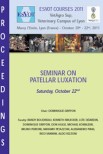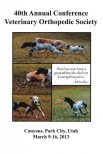Objectives: To compare the proportions of dogs with thoracolumbar disc extrusion that lose pelvic limb pain perception if surgery is performed on the day of admission or delayed overnight. To describe the outcome of those dogs that deteriorate to lose pain perception.
Materials and methods: Retrospective, single centre study on 273 client-owned dogs with thoracolumbar disc extrusion and intact pain perception, but inability to walk unaided on their pelvic limbs. Dogs were subdivided into two groups: early surgery (spinal decompression between their examination at day of admission and the following morning), and delayed surgery (did not undergo surgery between admission and the following morning). The proportion of dogs that lost pelvic limb pain perception overnight was compared between the early and delayed surgery groups.
Results: Seven of 151 dogs in the early surgery group lost pain perception overnight compared to 15 of 122 in the delayed surgery group (Fisher's exact test, P = 0.025). Number-needed-to-treat analysis suggested that 14 dogs (95% confidence interval: 7-106 dogs) need early surgery to prevent one losing pain perception overnight. Five of the seven dogs that lost pain perception in the early surgery group recovered pain perception by 3 weeks post-operatively, compared to eight of 14 in the delayed group.
Clinical significance: This study suggests that an overnight delay before spinal decompression increases the risk of clinically meaningful deterioration in dogs unable to walk following thoracolumbar disc extrusion.









